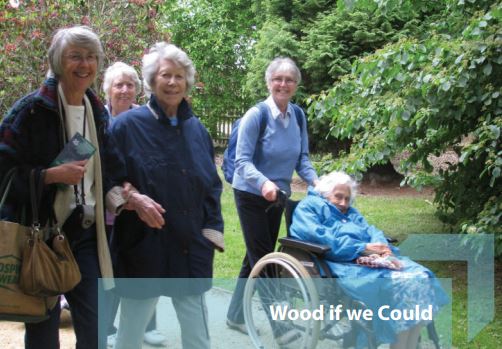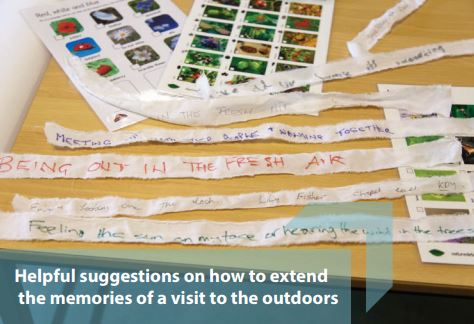Case Study
Wandering in the Woods – Enabling people living with dementia to benefit from visiting woodlands
Contact name
Steffi Burger
Institution name
EUROPARC Federation
Region & country
Essex, East Sussex and Wiltshire, United Kingdom
Summary
Anecdotally the therapeutic value of nature for people living with dementia has been recognised, but several organisations have sought to gather evidence to give this credence. In February 2011 the UK based social enterprise company Dementia Adventure published a report entitled “Living with dementia and connecting with nature – looking back and stepping forwards, exploring the benefits of green exercise for people living with dementia”. Dementia Adventure then followed up this report by a VisitWoods pilot project together with the organisations Woodland Trust and Caring Homes. The evidence gathered throughout the project implementation has shown that there are significant potential physical, social and emotional benefits for people living with dementia in care settings when they can get out into woodland.


Background of the project
Although the idea of connecting with nature is well-received in principle, there are practical challenges and barriers to accessing woodlands and other natural places for people living with dementia. The resource “Wood if we Could” addressed many of those to help this growing group in society to enjoy being in nature and benefit, physically, socially or emotionally, from what that contact can bring.
With the increase in human life spans, the demands of caring for large numbers of people with dementia have become more acute. It is important that people, and those who care for them, can live well with dementia. People living with dementia in care settings could perhaps be one of the groups in our society most in need of what woodland offers, namely space for stimulation, contemplation and restoration. However, they are often excluded from regular connection with nature.
Solution and actions taken
Working with Dementia Adventure, research and pilot activities resulted in the production of an advisory resource called “Wood if we Could”. This resource provides practical advice to people working with or caring for people living with dementia on how to plan and manage visits to the outdoors. It also provides helpful suggestions on how to extend the memories of a visit to the outdoors by sharing photographs or using the trip to inspire artwork by the group or individuals. Beyond, advice is also given on how to make publicly accessible nature sites more dementia friendly.
In 2011 the Woodland Trust, with funding from a range of sources, established the VisitWoods initiative, which aimed to promote the health and social benefits of spending time in nature to under-represented groups including elderly people. Recognising that elderly people, people living with dementia and disabled people are often excluded from enjoying nature through outdoor activities, the project considered the (currently limited) research intothe physical, social and emotional benefits that being active out in nature can bring. The research review was supplemented by a series of managed visits to woodland settings with dementia sufferers living in care homes, and associated before and after surveys of participants.
Other institutions or parties involved
This project was funded by the Woodland Trust as part of the Visit Woods project (www.visitwoods.org.uk) and delivered in partnership with Caring Homes (www.caringhomes.org) across three locations in Essex, East Sussex and Wiltshire.
Results
- Raised awareness of the needs of people living with dementia
- Increased confidence of care home staff, carers and family members of the potential benefits of visits to the outdoors
- Connected local care home staff with environmental organisations
- Won a prize for the most innovative partnership at the 2013 Scottish Dementia Awards
- Some 4,000 copies of the advice booklet “Wood if we Could” report printed and distributed
Challenges
Working with people with dementia in nature is still a relatively new field of work and organisations are working to build an evidence base.
Lessons learned
- The project’s findings indicated that there are potentially large cost-benefits, primarily from using the outdoors as a way of helping to reduce use of anti-psychotic medication and reducing the frequency and severity of anxiety, apathy, anger and depression which all too commonly predominate in long term care settings.
- Those who care for people living with dementia can also benefit greatly from being active in the outdoors.
Other resources
-
Wandering in the Woods pilot project
http:// www.dementiaadventure.co.uk/research/ visit_woods -
Advisory booklet “Wood if we Could”
http://www.dementiaadventure.co.uk/uploads/Wood%20if%20we%20could%20final%20 version.pdf -
Research report on green exercise undertaken by Dementia Adventure
http://www.dementiaadventure.co.uk/ uploads/green-exercise-and-dementia-neilmapes-february-2011.pdf -
Natural England literature review: “Greening Dementia”
http://publications.naturalengland.org.uk/publication/6578292471627776 -
Wye Valley Area of Outstanding Natural Beauty project: “Mindscape”
http://www.wyevalleyaonb.org.uk/index.php/mindscape/
Contact name
Steffi Burger
Institution name
EUROPARC Federation